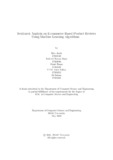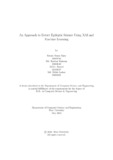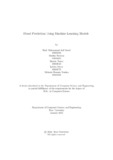| dc.contributor.advisor | Parvez, Mohammad Zavid | |
| dc.contributor.author | Salim, Farhana Binta | |
| dc.contributor.author | Sadat, Abu Md. | |
| dc.contributor.author | Ema, Maria Islam | |
| dc.contributor.author | Jhara, Anita Mahmud | |
| dc.date.accessioned | 2024-11-14T03:46:59Z | |
| dc.date.available | 2024-11-14T03:46:59Z | |
| dc.date.copyright | ©2021 | |
| dc.date.issued | 2021-01 | |
| dc.identifier.other | ID 16301185 | |
| dc.identifier.other | ID 16301105 | |
| dc.identifier.other | ID 17301180 | |
| dc.identifier.other | ID 19101670 | |
| dc.identifier.uri | http://hdl.handle.net/10361/24789 | |
| dc.description | This thesis is submitted in partial fulfillment of the requirements for the degree of Bachelor of Science in Computer Science, 2021. | en_US |
| dc.description | Catalogued from PDF version of thesis. | |
| dc.description | Includes bibliographical references (pages 43-46). | |
| dc.description.abstract | Mental stress is the main well being problem worldwide today. Mental stress is
by far the most common, responsible for most of all mental-brain diseases. The
high incidence, high impairment and heavy risk of illness make mental stress a
major health issue facing the planet and is predicted to become the most prevalent
disorder. Additionally, most of the time, suicidal people also hide true feelings
and fail to communicate their psychiatric problems to physicians. Mental stress
is a common as well as complex condition that has a limited explanation of its
origin. Explanations regarding disease causes are centered both on their psychology
and behavioral symptoms. Both factors that have led are currently being related
by experiments investigating and how depressive individuals handle reward and
punishment. Many studies have been proposed that people with such a disorder will
be unable to utilize e ective knowledge to guide actions. The speci c issues that need
to be addressed are, how to nd an easy, reliable and realistic way to diagnose mental
stress and recognize mental stress early in order to keep it from becoming a serious
and irreversible condition. To avoid diseases including health issues, the primary
prevention of mental stress utilizing machine learning classi ers based on reward
and punishment processing is important. The nervous system of man is the primary
subject of mental stress. For all of this purpose, a machine learning framework
is applied to evaluate the electroencephalogram signals for fty individuals in our
proposed model. For a successful mental stress detection application, this layout
has implemented a combination of features that supplies nine ML classi ers which
are Support Vector Machine, Random Forests, K-Nearest Neighbors, Decision Tree
classi er, AdaBoost classi er, Extra Trees classi er, Bagging classi er, Gradient
Boosting classi er, Gaussian Na ve Bayes Classi er to identify Comorbidity based
on reward and punishment processing. The experimental results indicate that Extra
Trees classi er, Gaussian Na ve Bayes Classi er and Random Forests have higher
success predicting the presence of mental stress. This implemented classi er based
on reward and punishment processing systems using EEG signals has the ability to
statistically detect mental stress. | en_US |
| dc.description.statementofresponsibility | Farhana Binta Salim | |
| dc.description.statementofresponsibility | Abu Md. Sadat | |
| dc.description.statementofresponsibility | Maria Islam Ema | |
| dc.description.statementofresponsibility | Anita Mahmud Jhara | |
| dc.format.extent | 59 pages | |
| dc.language.iso | en | en_US |
| dc.publisher | Brac University | en_US |
| dc.rights | Brac University theses are protected by copyright. They may be viewed from this source for any purpose, but reproduction or distribution in any format is prohibited without written permission. | |
| dc.subject | EEG data | en_US |
| dc.subject | Machine learning | en_US |
| dc.subject | Gaussian naive bayes classifier | en_US |
| dc.subject | Bagging classifier | en_US |
| dc.subject | Gradient boosting classifier | en_US |
| dc.subject | Extra trees classifier | en_US |
| dc.subject | AdaBoost | en_US |
| dc.subject | Decision tree | en_US |
| dc.subject | K-nearest neighbors | en_US |
| dc.subject | Support vector machine | en_US |
| dc.subject | Mental stress detection | |
| dc.subject | Computational neuropsychology | |
| dc.subject.lcsh | Electroencephalography. | |
| dc.subject.lcsh | Deep learning. | |
| dc.subject.lcsh | Neurophysiologic monitoring--Signal processing. | |
| dc.subject.lcsh | Neuropsychology--Data processing. | |
| dc.subject.lcsh | Computational neuroscience. | |
| dc.subject.lcsh | Mental illness--Diagnosis. | |
| dc.title | Detection of mental stress using EEG signal and classifier based on reward and punishment processing | en_US |
| dc.type | Thesis | en_US |
| dc.contributor.department | Department of Computer Science and Engineering, Brac University | |
| dc.description.degree | B.Sc. in Computer Science | |




